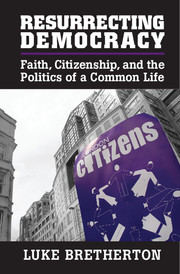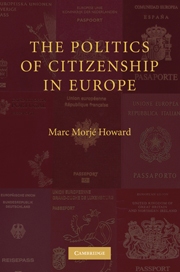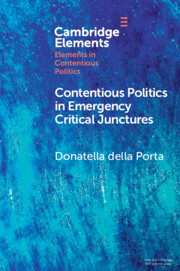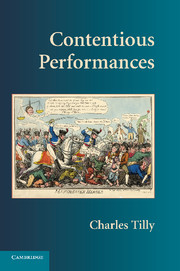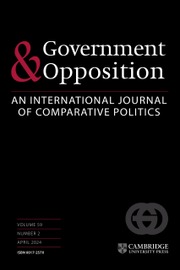Resurrecting Democracy
Faith, Citizenship, and the Politics of a Common Life
£30.99
Part of Cambridge Studies in Social Theory, Religion and Politics
- Author: Luke Bretherton, Duke University, North Carolina
- Date Published: March 2015
- availability: Available
- format: Paperback
- isbn: 9781107641969
£
30.99
Paperback
Other available formats:
Hardback, eBook
Looking for an inspection copy?
This title is not currently available on inspection
-
Through a case study of community organizing in the global city of London and an examination of the legacy of Saul Alinsky around the world, this book develops a constructive account of the relationship between religious diversity, democratic citizenship, and economic and political accountability. Based on an in-depth, ethnographic study, Part I identifies and depicts a consociational, populist and post-secular vision of democratic citizenship by reflecting on the different strands of thought and practice that feed into and help constitute community organizing. Particular attention is given to how organizing mediates the relationship between Christianity, Islam and Judaism and those without a religious commitment in order to forge a common life. Part II then unpacks the implications of this vision for how we respond to the spheres in which citizenship is enacted, namely, civil society, the sovereign nation-state, and the globalized economy. Overall, the book outlines a way of re-imagining democracy, developing innovative public policy, and addressing poverty in the contemporary context.
Read more- Offers the first systematic history of the work and impact of Saul Alinsky in the wider context of debates about the nature of democratic politics and citizenship and the delivery of social welfare provision
- The first systematic analysis of community organizing as a form of transnational, grassroots democracy
- Develops an innovative notion of interfaith relations as a 'civic practice', a way of addressing tensions and conflicts between different religious groups, particularly in the hyper-diverse context of global cities
Reviews & endorsements
'Dr Luke Bretherton has written a book of both great range and extraordinary depth. Whether detailing the inner workings of a citizens organization, leading readers through a history of social change, or reflecting on the philosophical and theological foundations that inform what Ella Baker termed 'the slow and respectful work' of democracy, his prose has the clarity and verve usually found in pieces written by accomplished essayists or masterful journalists. He has managed to be academically sound without cluttering his pages with academic jargon. Resurrecting Democracy is respectful, but never slow. It sets a new and very high standard for all those who wish to write about leaders and institutions struggling to create what the author calls the politics of a common life.' Michael Gecan, Co-Director, Industrial Areas Foundation
See more reviews'Every organizer or person concerned with organizing should read this book. Whether he or she agrees or disagrees with any particular point is immaterial - it is a very important intellectual scrimmage to undergo.' Ernesto Cortes, Jr, Executive Director, Interfaith Education Fund
'Luke Bretherton's Resurrecting Democracy addresses a crucial if largely unremarked crisis of our age: the radical shrinking of the democratic imagination. Citizens feel powerless to act collectively to shape their future and 'democracy' has been narrowed to mean electoral politics and voting. Combining an extraordinary case study of London Citizens, a broad-based organization of different religious faiths and political perspectives that has helped to set the public agenda in contemporary Great Britain, with brilliant innovations in political theory and theology, Bretherton shows that an expanded view of democracy can live and inspire in the twenty-first century.' Harry Boyte, Augsburg College, Minnesota
'London Citizens has changed British politics in the last few years and Luke Bretherton's terrific book both tells the organization's story and explains why it matters so much. The scholarship in places is breathtaking and the author's passion for the cause more impressive still.' Marc Stears, University of Oxford
'Resurrecting Democracy aims to demonstrate the fertile legacy of Alinsky as more than a bogeyman of right-wing American politicians and a figure of historical curiosity to the Left. Bretherton begins with a thorough and lucid history of the movement's origins and growth, continues with an ethnographic case study of community organization in London between 2008 and 2011, and ends with an ambitious survey of the theory of civil society, national sovereignty, and political economy, informed by Christian theology.' Jonathan Benthall, The Times Literary Supplement
'This is a very rich book, a work of theology and political theory, but also ethnography, which together casts light on the failures and frustrations of liberal democracy.' Paul Bickley, Third Way
'This book is full of wisdom and insight about the significant contribution BBCO can make to the practice of democracy' Roger J. Gench, Interpretation: A Journal of Bible and Theology
'With great skill and erudition, Bretherton immerses the reader in a complex web of discussions that are used to build an inventive proposal that critically appropriates, disapproves, and integrates the thoughts of many other important scholars. In this way, the reader is not only enriched by the constructive thesis that [the author] develops, but they are also empowered to deepen their knowledge and understanding of the issues debated in the book, and to creatively engage with the author's core arguments by referring to the many sources that Bretherton uses. I highly recommend this book to all those interested in the intersection of religion and politics.' Alessandro Rovati, Reading Religion (www.readingreligion.org)
'This engaging, insightful book weaves together theology, political philosophy, and ethnography in order to illuminate the ways in which community organizing can help build a common life in a pluralistic world. … This book will appeal to all those interested not only in political theology, but also community organizers seeking to be reflective about the goals and methods of their work.' A. W. Klink, Religious Studies Review
Customer reviews
Not yet reviewed
Be the first to review
Review was not posted due to profanity
×Product details
- Date Published: March 2015
- format: Paperback
- isbn: 9781107641969
- length: 492 pages
- dimensions: 226 x 150 x 30 mm
- weight: 0.7kg
- contains: 22 b/w illus. 1 map
- availability: Available
Table of Contents
Introduction
Part I:
1. The origins of organizing: an intellectual history
2. Faith and citizenship in a world city
3. Reimagining the secular: interfaith relations as a civic practice
4. An anatomy of organizing I: listening, analysis, and building power
5. An anatomy of organizing II: capacity, action, and representation
Part II:
6. Civil society as the body politic
7. Sovereignty and consociational democracy
8. Economy, debt, and citizenship
Conclusion.
Sorry, this resource is locked
Please register or sign in to request access. If you are having problems accessing these resources please email [email protected]
Register Sign in» Proceed
You are now leaving the Cambridge University Press website. Your eBook purchase and download will be completed by our partner www.ebooks.com. Please see the permission section of the www.ebooks.com catalogue page for details of the print & copy limits on our eBooks.
Continue ×Are you sure you want to delete your account?
This cannot be undone.
Thank you for your feedback which will help us improve our service.
If you requested a response, we will make sure to get back to you shortly.
×
